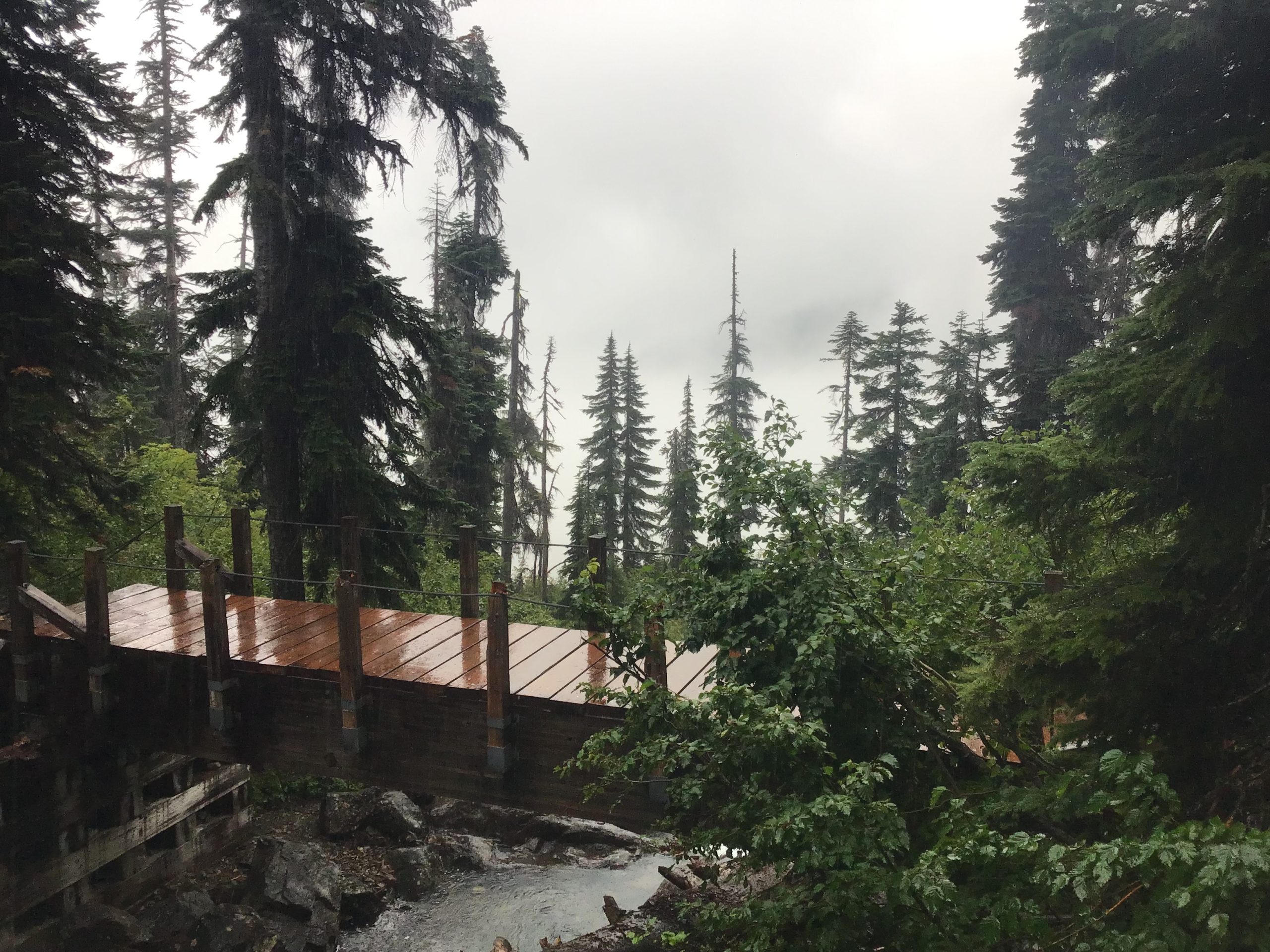PCT Receives $4.4 Million to Reduce ‘Three to Five Years’ of Backlogged Maintenance
The Pacific Crest Trail will receive an injection of $4.4 million from the $9 billion Great American Outdoors Act passed by Congress in 2020 to begin chipping away at years of deferred maintenance, the Pacific Crest Trail Association announced in early December.
The money, allocated by the U.S. Forest Service, will be used to beef up the PCTA’s corps crew and volunteer programs for backlogged maintenance in hard-to-reach areas, including high-elevation work in California’s Humboldt-Toiyabe, Inyo, San Bernardino, Sierra, and other national forests, starting in 2022.

Volunteers from Three Peaks Outfitters use pack mules and horses carry materials and equipment in support of PCTA and U.S. Forest Service work to repair a bridge over Delate Creek in Washington. Photo courtesy Jason Ridlon/Backcountry Horsemen of Washington.
“This infusion of much-needed funds means that the trail in areas such as Indian Flats in Southern California, Cottonwood Pass in the Sierra Nevada, and Wolf Creek Lake in the Humboldt-Toiyabe National Forest will receive maintenance for the first time in many years,” the organization announced. “Crews will be able to remove downed trees, install drainage dips, restore lost trail tread and repair and install trail signage.”
Funds for projects in Oregon and Washington have yet to be allocated, pending appropriation from Congress, says Jennifer Tripp, director of trail operations.
“We are hoping that this infusion will help take down our deferred maintenance backlog, which is three to five years at this point,” she says. “This will allow us to get back into precarious sections and continue restorations in the deep back country.”
More than half of the PCT is in state or federal wilderness areas, where regulations restrict the use of motorized equipment, including chainsaws. And the trail is one of the most remote National Scenic Trails, Tripp says, with a stretch of 238 miles from Kennedy Meadows South through Highway 120 with no road access.
That makes it more challenging and expensive to get crews to where the work is and keep them there, Tripp notes.
“Some areas you have to backpack in a day or two days just to get to the work site,” Tripp says. “We’ll be able to get back to some locations that are harder to get to, but these are not day or weekend projects. We’ll put a crew back there for a couple of weeks if not the whole summer.”
PCTA “corps crews” collaborate with the American Conservation Experience and Student Conservation Association to maintain and improve the trail in more remote areas.

A new bridge over Delate Creek on the Pacific Crest Trail in Washington, constructed by PCTA and U.S. Forest Service crews with volunteer help from Three Peaks Outfitters. Courtesy Christian Naegele.
The USFS is trying to resuscitate the traditional practice of using pack stock — typically horses and mules — to support maintenance and construction crews in the backcountry, Tripp says.
“It’s a traditional skill that’s really dying, but stock are essential to support trail crews and haul equipment into fire situations,” she says, noting that volunteer packers recently brought in materials to rebuild a bridge on the PCT in Washington.
The Great American Outdoors Act allocates revenues from energy development to provide funding for “maintenance for critical facilities and infrastructure in our national parks, forests, wildlife refuges, recreation areas, and American Indian schools,” as well as $900 million annually to “to invest in conservation and recreation opportunities across the country” through the Land and Water Conservation Fund. As part of the National Parks System, all 11 National Scenic Trails are eligible to receive funds under the act.
While the infusion of $4.4 million is good news, the money may only be used on deferred maintenance and the PCTA still depends on private donations to keep the trail open and safe for hikers and equestrians.
“This funding only provides support for our trail maintenance backlog,” the organization told supporters in early December. “It doesn’t support the work we do on a daily basis to manage and protect the trail.”
Featured image: Southern Oregon Rockers Volunteers work tread on a section of the PCT in 2020. Photo by Mick McBride via the Pacific Crest Trail Association.
This website contains affiliate links, which means The Trek may receive a percentage of any product or service you purchase using the links in the articles or advertisements. The buyer pays the same price as they would otherwise, and your purchase helps to support The Trek's ongoing goal to serve you quality backpacking advice and information. Thanks for your support!
To learn more, please visit the About This Site page.

 ">
">

